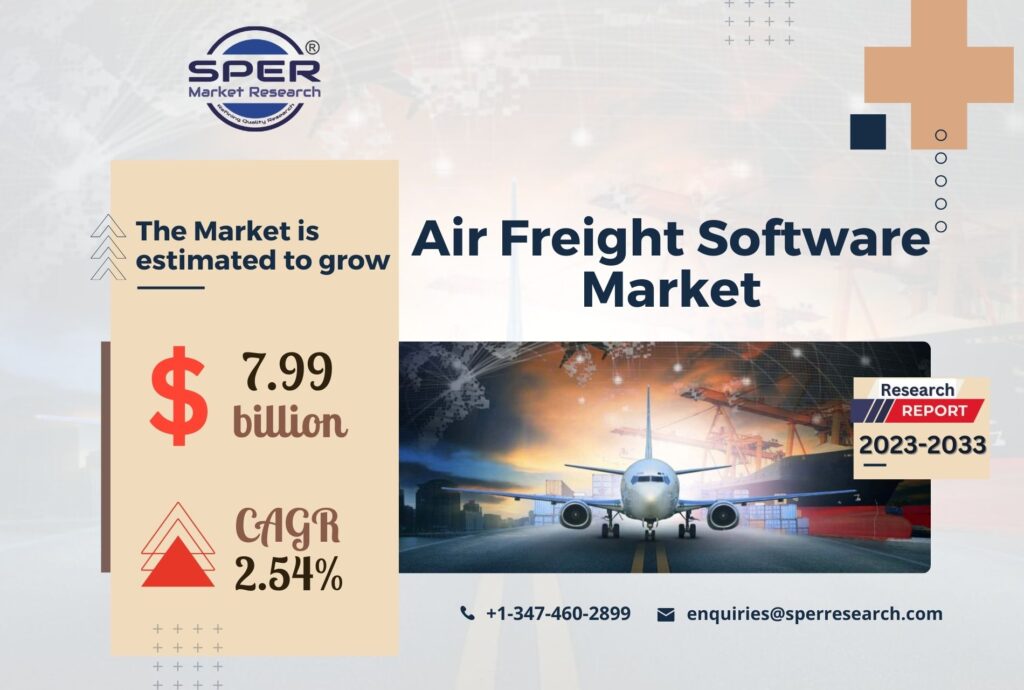Air freight software is a specialist application used by logistics organizations to optimize and manage air freight operations. It reduces mistakes made manually and enhances output by automating operations including drafting air waybills, tracking shipments, and stock management. The program improves stakeholder communication by providing real-time information transmission and maintaining transparency in shipment status and customs procedures. Companies that use sophisticated analytics obtain important insights into performance metrics, transit times, and costs, allowing for better decision-making and route optimization.
According to SPER market research, ‘Global Air Freight Software Market Size- By Deployment, By Air Freight Service, By Application, By End User- Regional Outlook, Competitive Strategies and Segment Forecast to 2033’ state that the Global Air Freight Software Market is predicted to reach USD 7.99 billion by 2033 with a CAGR of 2.54%.
Several key factors contribute to the growth and expansion of the air freight software market. Two important growth factors are the increasing globalization of trade and the surge in e-commerce activity. As companies expand their reach across international borders, the demand for efficient and timely air freight delivery develops. Air freight software enables businesses to manage their cargo more effectively and meet consumer expectations in the fast-paced global marketplace by delivering real-time tracking, automated documentation, and improved route planning.
There are numerous challenges affecting the growth and adoption of the air freight software business. One of the primary concerns is the air freight industry’s complexity and diversity. Diverse stakeholders, such as airlines, freight forwarders, customs officers, and handling agencies, use diverse systems and standards. Integrating and ensuring interoperability among various software systems becomes a significant problem, impeding seamless data flow and effective stakeholder collaboration.
Another key difficulty for the air freight software market is data security. Because these systems handle sensitive information like as shipment details, client data, and financial transactions, they are subject to cyber threats and potential breaches.
Request For Free Sample Report @ https://www.sperresearch.com/report-store/air-freight-software-market.aspx?sample=1
The COVID-19 outbreak had a significant impact on the global air freight software market. Because of the pandemic’s considerable travel restrictions, border closures, and supply chain delays, the air freight business faced unusual hurdles. Demand for specialist air freight services increased as passenger flights carrying a considerable volume of items in the belly-hold decreased dramatically. This increase, combined with the requirement for improved visibility and real-time tracking of shipments as logistics dynamics changed, resulted in a greater reliance on air freight software solutions.
Geographically, the global Air Freight Software market exhibits distinct trends and dynamics across regions, reflecting the industry’s diverse nature and regional unique characteristics. North America, being a key international commerce hub and home to several prominent logistics corporations and technology providers, has a sizable market share. Because of the region’s early embrace of sophisticated technologies like AI and IoT, there is a high demand for innovative air freight software s. Additionally, some of the market key players are, Freight pop, IBS, Inform Software, Magaya, Riege Software, The Descartes Systems Group Inc, TMSfirst, Others.
For More Information, refer to below link: –
Air Freight Software Market Research Report
Related Reports:
Follow Us –
LinkedIn | Instagram | Facebook | Twitter
Contact Us:
Sara Lopes, Business Consultant – USA
SPER Market Research
+1-347-460-2899


